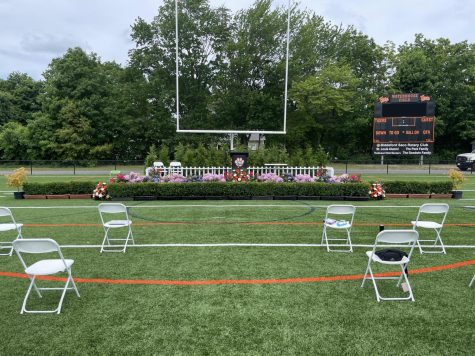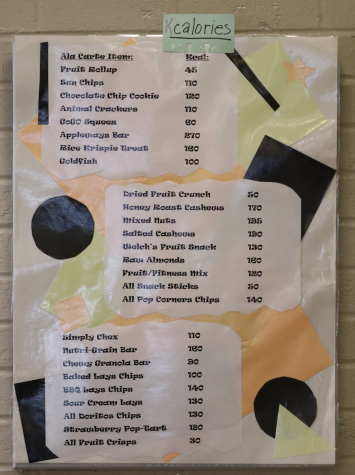Stop…HAMR time!

Despite their efforts to improve the 40 minute period of “advisory and HAMR time”, the school administration continues to deal with the issues surrounding the block.
Since the first day of school when it was announced, many students and teachers have brought to attention the inconveniences of the new program applied to advisory and HAMR time. Assistant Principal Elias Fletcher elaborates on the exact struggle.
“It hasn’t been working as expected,” said Fletcher. “It’s a new add-on from Infinite Campus–our data management system–a new program that they released late spring last year. This is really the first time really anybody’s tried to use it, it was simply to eliminate using another computer system.”
The difference in the system is the method by which students are scheduled. Senior Adric Garnett contrasts the change to that of the last school year.
“It was better,” said Garnett. “Every Monday, you would have three days–Tuesday through Thursday–where you’d choose which teacher to go to and get help [with class work]. That was a decent system because [it left] Mondays and Fridays for advisory or HAMR time.”
According to Senior Kurt Westley, one of the biggest problems for the students is being scheduled by the correct teacher.
“Instead of being forced inside of a classroom and scheduled to where they probably don’t want to go, students should go see the teachers they need to,” said Westley. “If you just failed a test, you can’t make it [to the teacher] as fast.”
Westley hinted at the original problem: teachers had to schedule students for HAMR a week ahead of time. Fletcher resolved this issue during Thanksgiving break, allowing teachers to schedule students only a day before.
Although the Infinite Campus tool still has its limitations in organizing students’ attendance, Fletcher is working with Infinite Campus for the upcoming resolve for that situation.
“We’re trying to set up and send a kind of mass email to everybody everyday about where they’re supposed to be,” said Fletcher. “The quicker we can do that, the more responsive we can be to students needs, the better off it is.”
Math teacher James Grover, new to Biddeford high school believes strongly in the idea of student responsibility in these situations.
“I wish there were a way for students to schedule themselves. If that were possible, that would be super convenient,” said Grover. “I think that it puts the ball in [the student’s] court–anything that gives students responsibility is a positive thing, at least in theory.”
Regardless of whether or not the students are scheduled to an appropriate classroom, there is still the issue of using the time appropriately. Senior Daniel Frechette encourages students to use the block to its full potential.
“As soon as you get in there, get your work done,” said Frechette. “Get caught up on your homework or whatever you need to do, just study.”
He adds that besides the occasional distraction of one or two students, it’s easy to concentrate, as long as the teacher keeps it controlled.
“I find its usefulness to be overshadowed by the general lack of communication between the staff about HAMR time,” said Grover. “But I also find that when it does get utilized–quite a bit gets done.”
However, utilizing the time depends on the student’s’ discretion. One of the reasons for the debate is because many students and teachers are distracted by the chaos of too many people in one room.
“If you have a bunch of kids in your room that you pulled for HAMR that are working, but you also have a bunch of kids in your room that didn’t get pulled elsewhere for your advisory, there’s a really good chance that they are going to be disruptive,” Grover said.
He points out that ‘it’s not because they’re intentionally trying to make it harder for the kids that were pulled through to learn, but because high school kids want to talk to each other.’ This leads to the next issue with the new program: students who are not informed of being scheduled.
“I haven’t gotten any emails [from teachers], and I’ve seen issues with other students where they don’t know where they’re supposed to go,” said Garnett. “Students are supposed to get an email, so they know exactly where they’re going for advisory and HAMR classes. It’s a nuisance.”
Grover relates to this experience with his students but says that it should be amended with effective communication between teachers.
“Sometimes teachers pull students for HAMR and they don’t know about it, then they get to advisory and their advisor says ‘you’re not supposed to be here today’; then they’re like, ‘uh, I don’t know where to go,’” Grover said.
Despite the confusion, students still remain in the classrooms until directed otherwise, posing a problem for teachers keeping track of attendance.
“Overall, I wish there was some sort of a teacher/staff global message board where could all communicate about who was where and things of that nature,” said Grover. “Then we wouldn’t have to ask questions and email each other–if we could see everybody’s requests or schedules or something, that would be sweet.”
History teacher Ryan Minzy made clear that the problems come from more than just a change in the scheduling tool, it was a disruption “in philosophy.”
“Essentially we have this expectation that all kids–given the option– will choose to look into the future and look at the best thing long term,” Minzy said.
The options for the students–in this case–being taking responsibility of their schedules and utilizing 40 minutes of HAMR time for academic purposes, or not taking an initiative for learning purposes and simply hanging out.
“Realistically, what are most people going to choose?” said Minzy. “Students are terrible at looking long term–even adults are terrible at looking long term. I know what I was like in high school, I said ‘let’s go to the gym, I want to shoot rounds; I want to hang out, I’ll go with you to the cafeteria,’ and there was nothing wrong with me, I was just a kid. That’s what most kids are like.”
With understanding of the frustrations from the school, Fletcher continues to work with Infinite Campus to improve the changes that were made.
“I know how hard it is to change your rules halfway through,” said Fletcher. “Kids get used to what they’re doing. Kids get used to what the expectations are [and] change of expectations midstream is tough. But it’s just like anything new, we should have this down and all of the stuff should be in place and ready to go before the end of the calendar year.”











